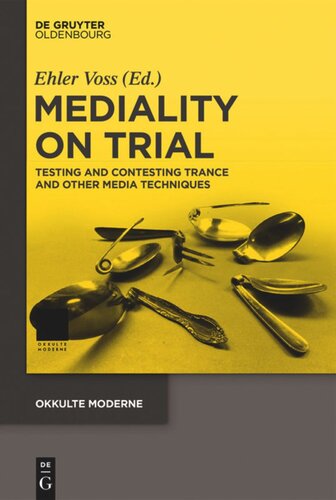

Most ebook files are in PDF format, so you can easily read them using various software such as Foxit Reader or directly on the Google Chrome browser.
Some ebook files are released by publishers in other formats such as .awz, .mobi, .epub, .fb2, etc. You may need to install specific software to read these formats on mobile/PC, such as Calibre.
Please read the tutorial at this link: https://ebookbell.com/faq
We offer FREE conversion to the popular formats you request; however, this may take some time. Therefore, right after payment, please email us, and we will try to provide the service as quickly as possible.
For some exceptional file formats or broken links (if any), please refrain from opening any disputes. Instead, email us first, and we will try to assist within a maximum of 6 hours.
EbookBell Team

4.8
64 reviewsThis volume addresses controversies connected to the testing of the capacities and potentials of mediums. Today we commonly associate the term "medium" with the technical communication between transmitters and receivers. Yet this term likewise applies to those who cooperate with agencies that exceed the presumed domain of the material world. Insofar as one presumes a division between distinctly opposed categories of religion and the secular, technical media tend to be associated with the secular and human (trance) mediums tend to be associated with religion after 1900. This volume concerns the ways in which the term medium still marks an overlapping of – and thus problematizes – the aforementioned division between religion and the secular, the personal and the technological.
The term medium carries with it a seed of doubt that is itself inseparable from investment in the medium's power: insofar as they communicate with an "other" realm, mediums offer the hope and promise of new possibilities and improved efficiency, and thus of a better life; yet they have simultaneously been under suspicion of altering (or even inventing) the messages they communicate. It is due to this combination of promise and suspicion that "mediumism" has tended to evoke scientific, religious, and moral controversies. Thus, we can speak of a "mediumistic trial" – that is, a process in which a medium is put to the test concerning its potentials and trustworthiness. Around 1800, experts were asked if a modern secular institution would be capable of inspiring, domesticating or excluding trance mediumship. This question has stayed with us ever since, and the answers have remained inconclusive. That is why the past and present of mediumship may be asked to elucidate each other.